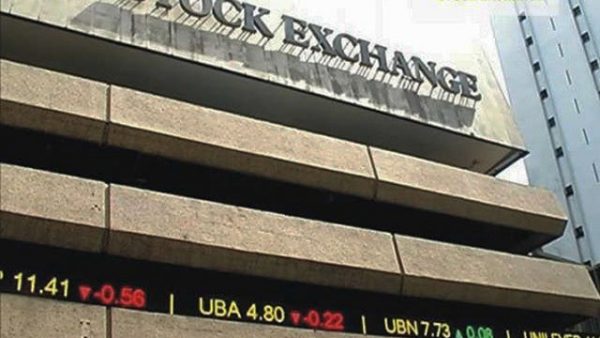NSE optimistic on market outlook
 The Nigerian Stock Exchange (NSE) has expressed optimism that the capital market would continue on a positive note in the year with expected growths in the global and national economies driving activities in the primary and secondary markets.
The Nigerian Stock Exchange (NSE) has expressed optimism that the capital market would continue on a positive note in the year with expected growths in the global and national economies driving activities in the primary and secondary markets.
The optimism came against the background of the world-record performance of the stock market in 2020, with a full-year average return of 50.03 per cent. Last year, about N2.55 trillion were also raised by the government and quoted companies.
Chief Executive Officer, Nigerian Stock Exchange (NSE), Mr Oscar Onyema, said the new fiscal year looks promising, although there remains global and national headwinds that could moderate performance.
According to him, expected recovery in global macroeconomic performance and government’s efforts at revamping the national economy would provide a strong support base for continuing positive market performance.
“The year has started on a positive note as the All Share Index (ASI) has already returned 2.0 per cent after 11 trading sessions. We expect the marginal reopening of businesses, normalisation of the economy and revenue-diversification drive of the Nigerian government to elicit positive sentiments throughout the year,” Onyema said.
He however said growth expectations should be noted with caution, as the recent second wave of COVID-19 in Nigeria and globally, may slow down renewed social and economic activities.
He said the NSE remains committed to aggressively pursue cutting-edge products and services, access new markets and deliver better value to its stakeholders.
He said the Exchange expects to reap more benefits from its ongoing demutualisation while fostering more strategic initiatives aimed at making Nigeria’s capital market the hub for the African markets.
According to him, several strategic initiatives were achieved last year, including approval in principle from the Securities and Exchanges Commission (SEC) to launch clearing and settlement of exchange-traded derivative products as Central Counterparty Clearing House (CCP) with the approval of NG Clearing Limited.
He noted that capital-raising in the fixed income market increased significantly last year with the NSE’s bond market capitalisation rising by 35.52 per cent from N12.92 trillion in 2019 to N17.50 trillion in 2020.
According to him, continuing the trend in recent years, the Federal Government dominated issuances, raising over N2.36 trillion, which comprised 92 per cent of total bond issuances.
He added that corporates also leveraged the low-yield environment to fund expansion objectives and pursue debt refinancing, raising a total of N192 billion.
He outlined some of the ground-breaking achievements in the debt segment of the capital market in 2020 to include the listing of Interswitch’s N23 billion 15.00 per cent Fixed Rate Series 1 bond, a premier bond listing that illustrated the potential of the Exchange to support fintechs and growth companies across various economic sectors.
Other major highlights were the listing of Dangote Cement’s N100 billion 12.50 per cent Series 1 bond under its N300 billion bond programme which became the largest corporate bond issuance in Nigeria’s fixed income market and the listing of Primero Plc’s first bond on the NSE – the Primero BRT Securitisation SPV Plc bond valued at N16.5 billion.
Onyema noted that 2020 was indeed a historic one for global capital markets marked by headwinds, sharp swings and steep losses, but largely remained resilient and orderly amid rising uncertainty.
He pointed out that the Nigerian stock market rode on the back of renewed investor optimism coupled with improved economic conditions and low fixed income yields to a major bull run.
“Of 93 global equity indices tracked by Bloomberg, the NSE All Share Index (ASI) emerged the best-performing index in the world, surpassing the S & P 500, +16.26 per cent, Dow Jones Industrial Index, +7.25 per cent and other global and African market indexes, to post a one-year return of +50.03 per cent,” Onyema said.
According to him, the Nigerian equities market got off to a strong start in 2020, returning 10.4 per cent by the eighth trading session and by October, the equities market entered a much awaited bull run. Buoyed by the formal declaration of the United States president-elect, unattractive fixed income yields and better-than-expected corporate earnings, the ASI recovered from first quarter 2020 to close the year at 40,270.72, a return of 50.03 per cent, erasing losses of 14.90 per cent recorded in 2019.
He noted that during its remarkable year end run, the ASI gained 6.23 per cent in a single trading session which triggered a 30-minute halt of trading on all stocks for the first time since the NSE Circuit Breaker was introduced in 2016 to safeguard market integrity in periods of extraordinary volatility.
“At the close of the year, the NSE’s equity market capitalization was up by 62.42 per cent, from N12.97 trillion in 2019 to N21.06 trillion in 2020 while market turnover saw an uptick of 7.25 per cent, from N0.96 trillion in 2019 to N1.03 trillion in 2020. Although Initial Public Offering activity was mute, the value of supplementary issues increased dramatically from 2019, rising by 851.37 per cent to N1.42 trillion, from N148.77 billion. Also noteworthy is that for the second consecutive year, equity market transactions were dominated by domestic investors who accounted for 65.28 per cent of market turnover by value-retail: 44.98 per cent; institutional: 55.02 per cent while foreign portfolio investors accounted for 34.72 per cent,” Onyema said.








